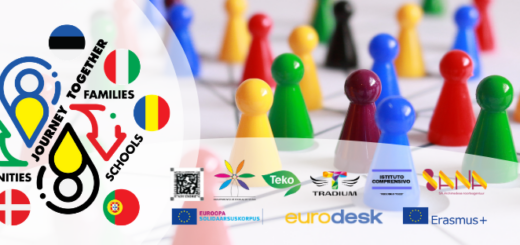Erasmus K2 project “Journey together” transnational meeting in Estonia
Tallinna Teeninduskool has hosted the first transnational meeting of the project: “Journey Together: Families, Schools, and Communities”. The meeting was held in Tallinn on 02.12.2021 – 06.12.2021. The main emphasis of the project is on increasing social inclusion, as Europe faces a long-term migration exigency, but also large-scale emigration within the Union, which diminishes the overall quality of education. Problems in educational establishments arise due to low social cohesion, such as early school leaving and insufficient expertise to enter the labour market, which exist in all the countries of the Union and by virtue of this, the project will be advantageous for all the partners and other stakeholders.
A transnational meeting between the national leaders in Estonia for the purpose of project management. Points to deal with:
First activity day
The first activity day took place in the coordinating school, Tallinna Teeninduskool. The day started with a team-building activity to get to know each other. The session aimed to create an effective atmosphere among the participants. Simple name games were introduced. The next workshop aimed to map fears and expectations, objectives and contributions to the meeting and to the project in general. Most of the hopes were related to intercultural learning, expectations to produce intellectual outputs and share good practices. The participants pointed out fears that covid might arise and how the pandemic might influence the scope of the project. The session aimed to create awareness of what are the project aims, objectives and what is the role of the participants, how they can contribute and what kind of benefits they can receive from the project.
All the schools provided a presentation of their organization. Brief presentations of topics related to the welcoming ceremony of the educational societies, the education system and the schools were made. The consortium had workshops on the themes of recalling the projects’ table of contents, allocation and coordination of the duties and responsibilities, determining a system of communication, diffusion of results and evaluation plan amongst participants. The meeting with the stakeholders included representatives of the student council (Siim-Tanel Pallase), headmaster of the school (Meeli Kaldma), non-governmental organization leaders (Rynaldo Puusep) and several others. The informal meeting with the stakeholders took place in a cosy atmosphere in Tallinna Teeninduskool’s restaurant where new initiatives and possible means of cooperation were discussed. The lunch was organized and provided by the students of Tallinna Teeninduskool. The day finished with a reflection session where the participants were able to reflect on their emotions of the day.

Second activity day
The day took place in the hotel conference room. During the first half of the day there were workshops on the theme of the project, sharing experiences: “Motivating students’ & their competencies by providing them more obligations for their own learning process and school life”, “Conflict Prevention and Involvement – intervention” and “Peer supporter system – Students as Mentors and Supporters for Other Students”.
On the second half of the day, there were workshops on general arrangements on the scheduling of TM’s (common standards for the selection of participants, initial teacher training, safety and insurance, transport, accommodation and schedule) Agreements on the development of upcoming local activities.
The main focus was on dividing the responsibilities between partners. Aside from the already complemented points, several clarifications were made. Estonia has the coordinating role. Portugal and Italy will be admitted the role of managing eTwinning/Twinspace and supporting other partners with digital concerns. Denmark is responsible for most of the intellectual output and supporting partners in the way through covision in creating strategies and brochures. Romanians are responsible for mobility tool and maintaining communication channels.
During the workshops partners discussed in-depth on how to execute planned activities. Such as were discussed how to create a Erasmus+ corner in schools, create and distribute the survey among students, manage eTwinning space, what should be the content and points of involvement strategy, modernization strategy, internationalization strategy, family day/grandparents day. The partners exchanged good practices on how to facilitate a conference, students/family training day. Common standards for the activities were set.






